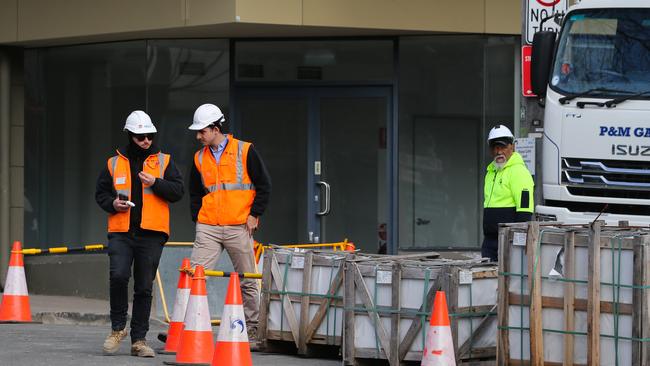
The rule book is part of a carefully conceived, long-term ALP-union plan to substantially increase union membership, even if that means gradually lowering Australian productivity.
I emphasise that the 700 pages of legislation will not have a sudden dramatic impact on most enterprises because this nation-changing manoeuvre will be implemented, step by step, over years.
Before setting out the likely implementation plan it’s important to emphasise the economic setting into which it has been launched.
Many large private sector enterprises – outside those being driven by government income – have quietly and wisely decided to stop hiring except in exceptional circumstances. More are now looking at retrenchment and in the light of the 700-page rule book, they are also speeding up artificial intelligence-driven labour savings.
Family enterprises are failing at a record rate and those that are solvent are also cutting back hiring and looking at retrenchments.
Gross domestic product per capita is falling and with that decline comes a lower standard of living as the cost-of-living squeeze begins to impact a greater proportion of the “affluent” segment of the population who are not caught in rent or mortgage stress.
For most of 2023-24 astute enterprises found ways to tap this affluent reservoir of spending, but as their spending tightens the profit declines will increase.
In the US it is clear the labour statistics overstated the health of the American economy, so interest rates are going to fall and Australia is likely to follow at least part of the way.
The prospect of lower interest rates is boosting sharemarkets around the world and Australia is following – partly because the long-term impact of August 26 is not widely understood outside larger enterprises.
Nowhere else in the world has an elected government, when faced the situations described above, decided to pass 700 pages of legislation that will engineer a big fall in private sector productivity.

Rather than simply list the measures, I will explore how the measures link together to gradually reduce the number of enterprise agreements and replace them with industry agreements.
For the unions, enterprise agreements have been a disaster in the private sector because there are just too many deals for the unions to cover. Not only is union membership in the private sector down to token levels, but large numbers of members are aged over 55 and are approaching retirement age.
Unions can dominate industry agreements, which will attract members, but it will take time. While unions know some industries well (like airlines and mining), over the wider spectrum the low union membership makes information difficult to obtain.
That’s why legislated union delegates in every enterprise, irrespective of the wishes of employees, is a vital step. That’s especially the case in enterprises with 15 or more employees, where the delegates must be sent to trade union headquarters and trained on what to look for in the enterprises where they work.
With data from the delegates, unions will be able to pick out situations where there are anomalies, creating breaches of the “same work same pay” principle. Unions will become alert to family enterprises that contact employees after hours.

Information in both areas will be used to ratchet up pay and portray the “boss” as untrustworthy and, most importantly, to attract union members. As knowledge is gained about the way enterprises work in various industries, the next step is to gradually convert enterprise agreements that are dominated by expensive labour practices into agreements that cover the whole industry.
It will be disaster for productivity but good for union memberships.
For unions and large corporates without import competition, the ideal model is road transport: where productivity is currently kept high by the use of family-owned, efficient and safe independent truckies.
Under the legislation, they will be hauled into the union system and their work will need to be consistent with high-cost union rules and industry agreements. The industry becomes a virtual “legal cartel” between unions and large corporates, and costs are expected to rise by at least 10 per cent because of the lower productivity. But the so-called ‘Amazon Clause’ insulates delivery of goods direct to households from the “cartel” costs. Amazon is the big winner.
The union hatred of Qantas and its former chief executive Alan Joyce triggered an early attack on Jetstar, which is being hauled before Fair Work Australia. Almost certainly Qantas will be next. Qantas and Jetstar can pass on any of the cost rises via higher domestic airfares but if, as is likely under the “same job same pay” rules, high-cost practices are extended to international fights it will eliminate parts of Australia’s international carriage. In that arena Qantas must compete against much lower cost overseas airlines.

Two of the most complex areas of the legislation are the so-called gig economy and casual labour.
The High Court set out simple rules for independent contracting and those rules have been made far more complex in the rule book in an attempt to substantially reduce contracting to be replaced by higher cost and less flexible labour. The legislation has considerable implications for those operating in trades. but it will require a series of court cases to determine exactly what it means.
Similarly in casual labour there is an incredibly complex set of rules to determine whether a person is eligible to be a casual employee and be entitled to the 25 per cent cash premium in exchange for no holidays.
It is unlikely unions will launch an immediate attack in that area but will gain more knowledge of the situation from the union delegates in all enterprises. The unions hate casual labour because most casuals are not union members so it will be attacked in due course using the complexity of the rule book.





Future generations will remember August 26, 2024, as a day of infamy as huge chunks of the 700-page, incredibly complex, industrial relations business rule book came into operation.